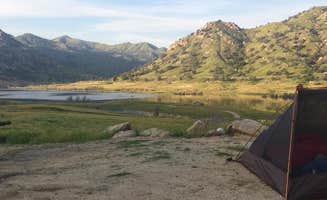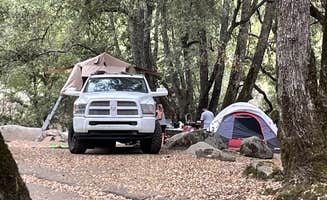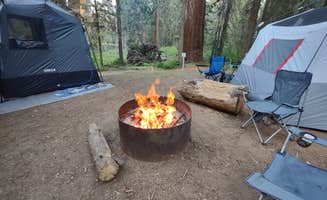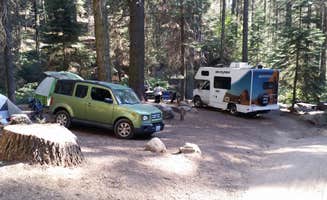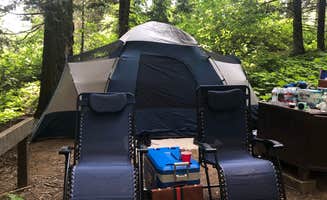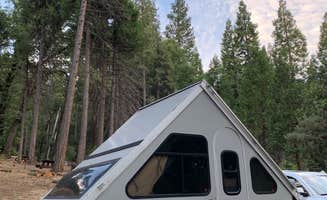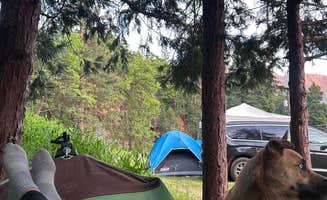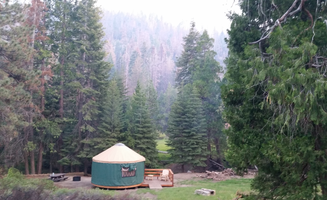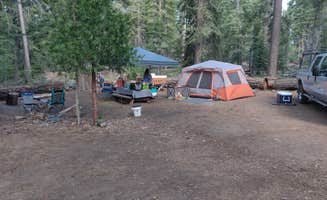Campgrounds near Springville, California range in elevation from 1,000 to 7,000 feet, creating diverse camping experiences across multiple climate zones. Most dispersed camping in the area requires a California Campfire Permit, obtainable online through the California Department of Forestry and Fire Protection. Winter access to higher elevation sites can be limited by snowfall from November through April.
What to do
Fishing opportunities: At Tule - Success Lake, campers can enjoy lake fishing year-round. "There is so much to do here and around this area. From hidden water falls and earth made rock slides this is one of my favorite places to come camping," noted Angelica G. The lake provides options for fishing and boating activities with rental equipment available at some locations.
Swimming holes: The forest campgrounds feature natural water features for cooling off during summer months. A camper at Wishon Campground reported, "There are several bathrooms, garbage and recycling bins, and a stream with an flat swim/wading area! (Water is cold but clean for taking a camp shower)." Many campgrounds have river access with small swimming areas.
Stargazing: Higher elevation sites offer exceptional night sky viewing opportunities. At Dispersed Camp near Sequoia National Park, one camper shared, "I was surprised how vacant this location was. It was absolutely gorgeous and the stars were unreal!" The 7,000-foot elevation and distance from urban light pollution creates optimal conditions for astronomy enthusiasts.
What campers like
Privacy between sites: Dispersed camping areas provide seclusion not found at developed campgrounds. A visitor to Dispersed Camp near Sequoia National Park noted, "My wife and I love this location and definitely will come back. There was only one other camper and they were 50 yards away." These areas typically have unmarked sites separated by natural features.
Wildlife viewing: The area supports diverse wildlife including deer and bears. At Balch Park Campground, campers reported, "We didn't have bears the two nights we stayed but someone said the bears were there the night before we got there." Another camper at Nelson Falls RV Park mentioned, "Saw deer in and around the campground almost daily."
Clean facilities: Despite the rustic setting, many campgrounds maintain well-kept amenities. One visitor to Quaking Aspen Campground shared, "The bathrooms were also kept very clean. I didn't get a chance to go hiking in the area, but there are trails nearby." Another camper at Tule - Success Lake noted, "It's really a cheap place to camp and have nice hot clean showers."
What you should know
Fire restrictions: Fire regulations vary by location and season. A camper at Sequoia National Forest Quaking Aspen Campground noted, "Due keep in mind you will need to obtain campfire permit online before you arrive depending if there are fire restrictions or not." Most areas require a California Campfire Permit even when campfires are allowed.
Road conditions: Many forest roads require careful driving and sometimes 4WD capabilities. "It was a very long, winding and narrow road to get there," reported one camper about access to Wishon Campground. Another visitor noted, "Nice quiet boondocking area downhill off the road. It's all dust roads so AWD would be best, but we did make it in our van."
Bear activity: Food storage precautions are essential throughout the region. At Dispersed Camp, a visitor cautioned, "Make sure you don't keep anything smelly in your tent or around your truck because there is a local bear that comes by in the middle of the night when everyone's sleeping." Some campgrounds provide bear lockers, but at others, campers must store food in vehicles or hang from trees.
Tips for camping with families
Swimming options: Water features provide natural entertainment for children. At Sequoia National Forest Belknap Campground, one camper shared, "River runs through the camp and there's a little swimming hole. Camp Nelson trail is a short walk away and the river runs next to most of the trail so there's always a water source."
Playground equipment: Some developed campgrounds offer recreational facilities. "Good place for fishing and boating. Campground really close to the water. Lots of playground equipment. Good for tenors and RVs with no hook ups," noted a camper at COE Success Lake Tule Campground.
Dust management: Parents should prepare for dusty conditions at many forest campgrounds. One family at Balch Park Campground advised, "The campground roads are pretty rough and it is super dusty. I use to camp here as a kid and don't remember it being this dusty. Remember, no showers, so bring wipes or something to clean up with especially if you have kids!"
Tips from RVers
Size limitations: Most forest campgrounds cannot accommodate large RVs. "Tents only and reservations needed; this is a popular camping destination," explained a camper at Sequoia National Forest Belknap Campground, highlighting the vehicle limitations at many forest sites.
Hookup availability: Full-service sites are limited to specific campgrounds. A visitor to Nelson Falls RV Park reported, "Full hookups for our 5th wheel, spacious sites, flushing restrooms and showers if you wanted. Starlink worked perfect, though there was wifi available." This is one of the few locations offering comprehensive RV services.
Cell connectivity: Service is unpredictable throughout the region. "Zero Cell coverage (we took that as a good thing), but make sure to download your google map," advised an RVer at Nelson Falls RV Park. Most higher elevation campgrounds have limited to no connectivity, while some lower elevation sites offer spotty service.


